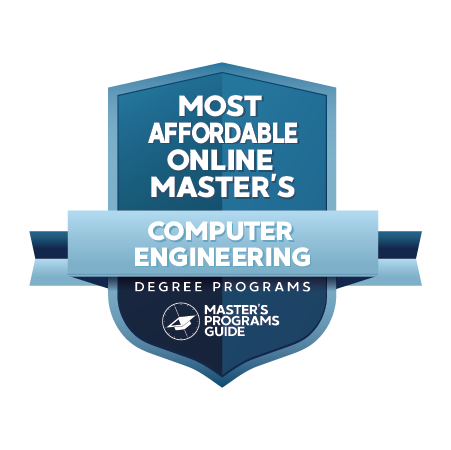Ready to find your ideal master's program?
www.mastersprogramsguide.com is an advertising-supported site. Featured or trusted partner programs and all school search, finder, or match results are for schools that compensate us. This compensation does not influence our school rankings, resource guides, or other editorially-independent information published on this site.
Technology is advancing—and it’s doing so faster than we can keep up with it, in fact.
If you’re a computer engineer, you know the challenges that this rapid growth can present. Each day, computer engineers are faced with new problems to solve. Often, these problems are ones for which technological solutions have yet to be invented.
Because of this exponential growth, companies in just about every industry are hard at work trying to develop and integrate unique technologies that can revolutionize the way they do business. Professionals with skills and formal education in computer engineering are in great demand.
The best way to push your resume to the top of the pile?
You need to earn a master’s in computer engineering.
While a bachelor’s degree serves as a wonderful entry point to this field, a master’s degree will help you learn the advanced skills necessary to boost your career trajectory. Not only will you develop skills in machine learning, computer hardware, computer architecture, cybersecurity, and more, but you may be able to specialize your learning in one particular area.
The benefit of this is that you can focus your studies on an area of interest that you perhaps did not have enough time to explore while you were an undergraduate. You will be able to conduct significant amounts of research in this field, too, with many graduate students going on to publish their research in academic journals.
If you have specific career ambitions, earning a master’s degree in computer engineering is one of the best ways to do so. You will be able to concentrate on your degree and your course of study so that you can be the best-prepared candidate for any job.
Unfortunately, many students—perhaps you are one of them?—are deterred from pursuing graduate studies because they think they can’t afford them.
That couldn’t be further from the truth.
Today, there are plenty of ways that you can earn a master’s in computer engineering both online and on-campus. An online degree tends to be one of the most affordable and convenient options for students who want to save a bit of money. It’s also a great pathway for a student who is already employed in the industry.
Most online computer engineering programs are self-paced, letting you complete your courses at your own speed. Some provide course credit for material you already know, letting you breeze through the course requirements and only sit through lectures on what you haven’t already learned.
Plus, online degrees tend to be more affordable. Many are offered at in-state tuition rates, letting out-of-state learners pay rock-bottom tuition prices in exchange for top-notch instruction.
So what are you waiting for? There are plenty of reasons to consider pursuing one of these best affordable online master’s in computer engineering—it’s up to you to decide which program will be right for you.
See Also: 10 Best Master’s in Industrial Engineering
Common Application and Admission Questions
Each university has different requirements when it comes to the enrollment process. Always check in with your college of choice to make sure your application will measure up and meet all of the listed requirements. This can save you some serious headaches later on down the road!
To start with, you will need to hold a bachelor’s degree. Often, this degree must be in a related area, such as computer science or software engineering. That’s not always the case, though, as some programs include a few prerequisites, entry-level classes that will acquaint beginners with the basics they need to understand more advanced course materials.
There are other programs that do not require a bachelor’s degree for entry because they are what is known as “4+1” programs. In this kind of program, you will begin your classes as a college freshman with the ultimate goal of completing a bachelor’s degree and a master’s degree in computer engineering, all within five short years.
These programs tend to be highly competitive, and you’ll need to have a high GPA in order to qualify. However, they can save you a ton of time and money and are often available in an online form. Check with your school of choice to see if this might be an option for you!
When it comes to GPA, you will often need to meet minimum GPA requirements. Usually, this hovers around a 3.0 on a 4.0 scale, but that can vary depending on the school to which you are applying. Sometimes, you may be able to make up for shortcomings in your GPA by meeting or exceeding other benchmarks elsewhere in your application.
In your application (or in an application essay), you may be asked about your specific career ambitions. It’s important that you be as detailed as possible in this essay, as well as honest. Not only can this essay help the admissions team get a snapshot of who you are as a candidate, but it will also give them a clear picture of how the university can help you meet your goals.
Plus, many schools offer unique program specializations to allow you to hone your skills in a particular field of study. You may be able to specialize in topics like networking and communications, systems design, cybersecurity, and more. This will give you some leverage when it comes to finding a job.
Some schools may also require test scores from the Graduate Record Examination, or GRE. This test is used to assess your verbal and quantitative skills and is used as an admissions requirement for many, though not all, graduate-level programs. Often, this test will need to have been completed within the last five years in order to be eligible.
You may have to supply things like letters of recommendation and a resume, too. These are generally needed so that you can demonstrate your work experience and your proficiency and motivation in computer engineering.
Typically, a master’s degree in computer engineering will consist of 30 to 36 credits and can be completed in two years or less. If you choose to complete your classes on a part-time basis, you may be able to extend the timeline and complete your degree in four or five years.
See Also: 10 Best Computer Engineering Graduate Schools
What About Financial Aid & Scholarships?
If you’re planning on applying to a graduate program in computer engineering, it’s important that you start thinking about how you will pay for it early on. Likely, you already are thinking about it—which is how you stumbled upon this article!
The good news is that many online universities offer tuition at a lower price than what is billed on campus. If you’re attending a public school, you will likely be billed at the in-state rate (although this isn’t always the case, so be sure to check). You may also pay a lower “distance learner” tuition rate.
At any rate, keep in mind that your expenses will automatically be lower because there are several costs that you simply don’t need to factor in at all. For example, you probably aren’t going to have to pay for things like commuting costs or on-campus parking fees. You won’t need to pay for room and board, either, which many times, is just as costly (if not more so!) than tuition.
Don’t let a school’s broadcasted tuition rate blindside you, though. It’s important that you consider the full package when it comes to financial aid, and not just the “sticker price.” Many private schools end up being just as affordable—if not more so—than public schools because they make more financial aid and scholarships available to students.
Start thinking about financial aid early, ideally long before you need to apply. Put together a list of all of your accomplishments, career goals, and supporting documents, because you may have to submit these for scholarships at the university to which you are applying.
You will also want to have your financial documents in order, including tax returns for the last few years. In order to qualify for any need-based financial aid (which would include federal and state grants along with federal loans) you will need to complete a FAFSA (Free Application for Federal Student Aid).
This document is available on January 1 of the year in which you intend to apply to college. Even if you don’t plan on starting classes until September, you’ll want to complete the FAFSA as soon as you can so that you can put your application at the front of the line for any grants and scholarships that might be available only on a first-come, first-served basis.
In addition to grants, some universities offer program-specific scholarships. There are others that offer merit-based awards that take your grades and other past accomplishments into consideration.
Don’t be fooled into thinking that financial aid ends at your university’s financial aid office, either. There are lots of outside scholarships you can apply for, too, most of which are offered by nonprofit organizations and industry leaders. The key here is in applying for scholarships early and being aware of how they will mesh with your background, career goals, and financial needs.
Finally, don’t forget the power of elbow grease when it comes to financing your college education. Many universities include work-study or graduate assistantships as part of the financial aid package. Not only will you be able to finance your education with one of these work programs, but you’ll gain some valuable experience in the process, too.
How Much Can I Make With a Master’s in Computer Engineering?
Once you start researching financial aid and scholarship opportunities, you might wonder if the overall cost of a computer engineering degree is truly worth it. After all, even with financial aid factored in, a computer engineering degree can be expensive. On average, you’ll be charged about $700 to $1500 per credit hour, which can be $21,000 to $45,000 or more, depending on the length and cost of your degree.
However, earning a degree in computer engineering is worth it. Besides the intrinsic benefits you’ll gain from advancing your education, there are some great reasons to obtain one of these degrees even from only a “dollars and cents” perspective.
Computer engineers earn much higher salaries than most other professionals. The Bureau of Labor Statistics estimates this job to be one of the fastest-growing of its kind, with employment expected to grow by at least 6% between 2018 and 2028.
Demand for people who have the skills necessary to work in these jobs is high. It’s expected to only continue to grow as newer, faster technology and mobile networks continue to be in-demand by companies all over the world.
You’ll earn a high annual salary, too. Median pay in 2018, according to the Bureau of Labor Statistics, ranges from a low of $53,470 to a high of $118,370, with computer and information research scientists earning the highest salaries in this group. Professionals who work for private companies, as well as those who work for the federal government or in design-related services, tend to earn the highest salaries on average.
While you can get many of these positions—like a job as a computer programmer or systems analyst—with just a bachelor’s degree, a master’s degree will make you more competitive. Not only that, but you’ll be eligible for more promotions and pay raises once you gain employment, too.
There are some jobs—like the aforementioned computer and information research scientists—for which a master’s degree is an entry-level requirement. Pursuing advanced training really pays off, doesn’t it?
Another benefit of earning one of these degrees? You will be able to work from virtually anywhere in the world. Not only are computer engineers in-demand everywhere, but their skills and job duties are as such that they can often be completed from home.
Not only that, but your job opportunities will be virtually limitless. You could work as a computer programmer or analyst. You may choose to work instead as a software developer, network architect, or hardware engineer, too.
Just about every industry requires computer engineers in order to be successful. Whether you plan on working in manufacturing, defense, aerospace, telecommunications, or even the automotive industry, you’re sure to find a job once you have a solid education in computer engineering to back you up.
What Are the Best Online Master’s in Computer Engineering Degrees?
We know that you have educational goals that you’re itching to pursue, but you may not know where to start. The editors of Master’s Programs Guide utilize a unique ranking methodology based on the following five aspects:
25% Overall Degree Affordability: Average cost of undergraduate and graduate tuition per school
25% Graduation Rate: Number of students who start at the university and actually finish there
20% Earnings Potential: Average mid-career salary of school alumni
20% Selectivity: The number of students who apply versus the number who actually get accepted
10% Online Graduate Offerings: The number of programs offered online in each department
At Master’s Programs Guide, we strive to do our best to guide you and your family toward a fruitful academic career. The pursuit of knowledge is a noble one, and we want to help you reach your goals.
#1. Texas A&M University
Master of Engineering-Computer Engineering
If you want to enhance your career prospects by adding some solid research to your resume, you might want to consider studying at Texas A&M University.
This large public research university has a main campus in College Station, TX. However, you don’t have to be studying on campus to benefit from this institution’s broad research offerings.
Texas A&M is home to a large body of more than half a million students and alumni, many of whom study or studied online. The school has the largest student body in the United States and is designated as a land, sea, and space grant institution. It is the only school of its kind to hold such a designation and is a proud reflection of the school’s strong research capabilities.
In the computer engineering program at Texas A&M, you’ll be required to take at least 30 credit hours, most of which will be in the College of Engineering, the College of Science, and the College of Business.
When you study in this program, you’ll be able to get a strong foundation in physics, chemistry, and mathematics. You’ll take classes in electrical circuits, digital circuits, electronics, computer architecture, operating systems, and more. You can choose from two tracks: electrical engineering or computer science.
The electrical engineering track of this program uniquely focuses on the involvement of large-scale integrated (VLSI) circuits and systems along with computer design. The degree offers the best of both worlds in that you’ll meet all the core requirements of an electrical engineering degree along with those from the world of computing.
In the computer science track, you’ll take classes in topics like computer architecture, computer networks, real-time computing, robotics, computer graphics, and more. Both concentrations embrace multiple specialty areas, including analog and mixed-signal, energy and power, and information science and systems. To say this is a diverse, research-focused degree is an understatement, to say the least.
The graduate programs in the Department of Electrical and Computer Engineering at Texas A&M are consistently ranked among the top 15 public universities in the United States. The apartment is home to more than 70 tenured/tenure track faculty and just 750 graduate students, allowing all students to access a high-quality research program even when studying from afar.
Tuition rates are low and financial assistance is available to each and every student. This is typically offered in the form of research assistantships, teaching assistantships, scholarships, and fellowships. Many of these are administered by the department and some are offered by individual faculty members in unique areas of research.
The department offers external fellowships, too, along with a range of scholarships. In fact, each year, the department offers several $1,000 scholarships to incoming students. These are competitive, but can also qualify you to pay the in-state tuition rate—it’s definitely worth submitting an application!
#2. Georgia Institute of Technology-Main Campus
Master of Science in Electrical and Computer Engineering
Known simply as “Tech” to many students, the Georgia Institute of Technology is a hub for students seeking some of the best technologically-focused degrees in the country.
The Master of Science in electrical and computer engineering at Georgia Institute of Technology-Main Campus is just one degree among many that are offered fully online. Not only can you choose to pursue the stand-alone Master of Science, but the school also has a joint B.S./M.S., an online Master of Science, a Master of Science in bioengineering, and a Master of Science in cybersecurity.
No matter which pathway you select, you’re sure to be blown away by the curricular opportunities. In the online Master of Science, you’ll be able to pursue a major in either electrical and computer engineering or cybersecurity. Both of these programs are administered by Georgia Tech Professional Education.
Designed for working professionals, the program lets you complete your class on your own schedule, in the comfort of your own home. You don’t have to sacrifice your career in order to do this, either, as you can interact with your instructors and the course material by using multi-platform digital learning tools and taking classes when it’s most convenient for you.
You will be able to pursue a wide variety of specialty options, including those in electrical energy systems and controls, computer engineering, and telecommunications/digital signal processing. The cybersecurity degree has a unique specialization in energy systems as well.
Your experiences in the classroom at Georgia Tech will be accentuated by those outside of the classroom. There are numerous study abroad programs available to graduate students so that they can broaden their professional and personal horizons. Not only are international learning experiences offered in Lorraine and Shenzhen, but the university also sponsors a Global Internship Program.
This Global Internship Program is a goldmine for finding internship opportunities at companies all around the world. You’ll not only be able to experience life-changing international travel, but you can engage in some practical training and cross-cultural learning that will take your graduate-level training to the next level.
There are plenty of student organizations for you to check out, too, even as an online student. These organizations can enhance your learning as they allow you to network with peers and professionals in the industry. It’s a great way to meet people and to outreach in your local community—as well as build your resume.
In addition to the more than 300 different student organizations that are offered around the larger Georgia Tech institution, there are several organizations specific to the School of Electrical and Computer Engineering, too. These include ECE Ambassadors, The Hive, Georgia Tech Institute of Electrical and Electronics Engineers, and Eta Kappa NU (the honor society for the department).
The computer engineering program at Georgia Tech is highly affordable. Graduate students can qualify for substantial financial aid packages to cover tuition along with a stipend for living expenses. Financial aid includes scholarships, fellowships, teaching assistantships, research assistantships, and internship positions.
#3. Colorado State University
Master of Engineering in Computer Engineering
Despite being one of the largest public research universities in the state of Colorado, Colorado State University is known for its innovative, student-centered approach.
Ranked as one of the top National Universities—as well as one of the Best Colleges for Veterans—by U.S. News & World Report, Colorado State University has small class sizes, even for online learners. You’ll enjoy a small student-to-faculty ratio of just 16:1, allowing you to get to know all of your peers and faculty members in your chosen major.
The online master’s in computer engineering at Colorado State University is an excellent program for students who want to increase their earning potential, work on higher-level projects, or simply enhance their skills in the discipline. The curriculum is highly customizable and can be tailored to meet just about any student’s needs and career goals.
This coursework-only degree is perfect for students with interests in disciplines such as artificial intelligence, robotics, data science management, and machine learning. You’ll focus on a variety of software and hardware applications, with a heavy emphasis on network programming, internet protocols, and computer system design.
You’ll also learn some of the most pressing industry trends and benefit from innovative faculty research. You’ll become part of a close-knit academic community when you enroll, even when you’re studying from afar.
The department of electrical and computer engineering at Colorado State is one of the university’s most impressive. In fact, faculty here are responsible for more than a third of the university’s issued patents since 2015. These patents, in most cases, were researched and formulated with serious input from graduate students studying both on-campus as well as online.
If you want to get involved in research while you’re pursuing your master’s degree, there’s no better place to do it than at Colorado State. Faculty research interests run the gamut, covering everything from satellites inside hurricanes to the creation of new technologies for non-invasive medical biopsies.
Colorado State puts its money where its mouth is. It not only is the headquarters for the Engineering Research Center for Extreme Ultraviolet Science and Technology, but it’s also home to the Engineering Research Center for Collaborative Adaptive Sensing of the Atmosphere and a handful of other research facilities.
Best yet, this degree is identical to the one offered on campus. You’ll learn from the same qualified faculty. These faculty are experts in their fields and incorporate their internationally recognized research projects and industry experience into their teaching on a daily basis.
You’ll be able to explore all kinds of career enhancement opportunities, too. Not only can you engage in research, but you’ll be able to network with industry professionals from all over the world.
#4. University of Florida
Master of Science in Electrical and Computer Engineering
The University of Florida has a pretty colorful history. This school can be traced back to 1853, when it first opened its doors as the East Florida Seminary and three other predecessor institutions, all located in Ocala, FL.
The college has been reorganized several times—most notably in the post- World War II era—and is today a leading public land-grant, sea-grant, and space-grant research university in Gainesville, FL. With a large population of 56,079 students studying on campus, you might be curious about what this school has to offer online students.
The short answer? A lot.
The university has a booming population of nearly 4,000 online learners, many of whom take classes exclusively online. It is not only ranked as a top National University, but it’s also received the accolade of being a Best Value School, according to the U.S. News & World Report. Classes here are small and close-knit, taught by faculty members who are dedicated to student success. The average student-to-faculty ratio is just 18:1.
The University of Florida offers its dynamic Master of Science in electrical and computer engineering through its innovative EDGE (Electronic Delivery of Gator Engineering) platform. Through this platform, you will not only earn the same degree that students studying on campus will, but you’ll also get access to traditional and novel career tracks.
With EDGE, you can follow a preset pathway or choose your own. Take up to three classes per semester, or take an entire semester—the choice is yours. You’ll be able to build your own curriculum, choosing only the courses that matter most to you. Ultimately, you’ll take 30 credits or ten 3-credit courses.
You aren’t limited to classes within the department, either. You can take up to three classes outside of the department, including those in subjects such as entrepreneurship, computer science, innovation, and more. There are hybrid options if you don’t want to take all of your classes online, either.
Curious about what kinds of classes you’ll take? Sample titles include VLSI Circuits and Technology, Noise in Linear Systems, and Foundations of Digital Signal and Processing. Courses are offered during the summer, fall, and spring semesters.
To be eligible for admission, you will need to have completed coursework in subjects like digital logic, electronic circuits, and microprocessor applications, to name a few. You should have a B or higher in core computer engineering classes at the undergraduate level, too.
Enrolling online at the University of Florida presents several benefits. Not only will you be able to take classes at the times that make the most sense for you, but you’ll also be eligible for super low tuition rates. On average, you’ll pay about $448 per credit hour. Financial aid is available, too, but this tuition rate reflects in-state tuition—even for out of state students.
#5. Iowa State University
Master of Engineering (MEng) Degree in Computer Engineering
With more than $19.64 million in research expenditures each year and 11 different research centers and institutes, it would be easy to assume that things are all work and no play at Iowa State University.
Lucky for you, that’s simply not the case. Although this public university is located in a sleepy Midwest town, Iowa State University offers more than 800 student organizations. Many of these are available to online learners as well as those studying on-campus.
A 100% online program, the Master of Engineering in computer engineering at Iowa State University is designed with working professionals in mind. It is perfect for aspiring computer engineering professionals who wish to advance their careers, and can generally be completed in just five years. That’s with taking just one class each semester!
In order to apply, you will need to have undergraduate training in computer engineering. You may be eligible for admission if you have a bachelor’s degree in a related area, too. You should hold a GPA of a 3.0 or higher on a 4.0 scale, and you’ll also need to submit GRE test scores, a statement of purpose, and three letters of recommendation.
You can apply for spring or fall admission.
This coursework-only degree is incredibly flexible, requiring no creative component or thesis for completion. You will instead complete just 30 credit hours of study, 18 of which must be in electrical or computer engineering.
You can also complete up to three credit hours of independent study. This will allow you to further explore and area of interest while studying conveniently on your own terms. Some of the most popular classes you can take include Network Protocol and Security, Special Topics in Computer Engineering, and Concurrent Systems.
Earning a degree with Iowa State University’s online platform is more than just a convenient choice—it’s also a smart career move. Not only will you enjoy a small program with an enrollment of fewer than 250 master’s-level students, but you’ll be highly likely to get a job after graduation, too. In fact, 90% of graduates have accepted job offers within just six months of graduation! Learners in this program are driven to succeed by a close-knit faculty body that is 55 members strong.
This program boasts low tuition and is highly affordable. The department alone awards more than $740,000 in scholarships each year, making it a good choice for cash-strapped graduate students. The electrical and computer engineering programs are ranked among the top 25 in comparison to other public programs by the U.S. News & World Report.
Not only that, but Iowa State receives high marks across the institution’s departmental walls. It’s ranked a Best Value School and a Best College for Veterans by U.S. News & World Report as well.
#6. North Carolina State University at Raleigh
Master of Science in Computer Engineering
With more than 100 programs to choose from, it’s easy to say that North Carolina State University at Raleigh is a bit of a jack of all trades when it comes to preparing students for the workforce.
As the largest four-year college in the state, the school has hundreds of potential majors along with nearly 600 different clubs and student organizations. With a small student-to-faculty ratio of 14:1, the school is ranked as a top National University by U.S. News & World Report, too. This is not only a testament to the outstanding level of faculty expertise at this school, but also to its personalized instruction.
The Master of Science in computer engineering at North Carolina State is designed for students with previous undergraduate training in engineering—particularly those who want to expand their technical skills. It includes core content areas in networking, computer architecture and systems, and VLSI systems.
With 30 credit hours required, this program does not require a thesis. To apply, you’ll need to have a bachelor’s degree in computer or electrical engineering with an overall GPA of at least 3.25 on a 4.0 scale. You will also need three letters of recommendation and GRE test scores.
This flexible program allows you to take up to nine credit hours of coursework, although you can take as few as three if you are trying to juggle work with school. You’ll have a generous six years to complete your course requirements. When you are admitted, you will work closely with an academic advisor to develop a detailed plan of study.
The program is one of sixteen different online graduate programs at North Carolina State—nearly all of which are nationally ranked. You’ll receive the same high-quality education in computer science and engineering that you would receive on campus, but with the flexibility and convenience of online learning to help you meet your goals.
The computer engineering degree emphasizes the practical components of engineering along with soft skills like management and communication. The curriculum serves as a “bridge” to industry, connecting students with employers and alumni from around the world. Courses are carefully designed to include complex projects, real-world skills, and demonstrable knowledge.
It’s available as a thesis and non-thesis program. You will be able to choose from areas of specialization like networking, software, VLSI systems, and computer architecture.
Graduates of this program are highly sought-after by employers in a variety of industries. You’ll have the advanced learning and specialized training necessary to work in just about any industry. In addition to hands-on courses and research opportunities, you’ll also engage in regular workshops and panels on research skills, Ph.D. programs, job hunting, communication, and more.
You won’t have to pay out the nose for quality workforce preparation, either. Tuition starts at just $446 per credit hour for resident students, with tuition discounts for taking more courses per semester. Significant financial aid is available, too.
#7. University of Arizona
Master of Science in Electrical and Computer Engineering
At the University of Arizona, one of the state’s largest institutions of higher education, some of the most popular majors include management, business, marketing, biology, and health sciences.
Yet the school offers a hidden gem to aspiring computer engineers— its master’s degree in computer engineering. Available online, this program is just one of more than 100 different majors offered online and on-campus at this exceptional public institution.
The Master of Science in electrical and computer engineering at the University of Arizona’s College of Engineering is taught by expert faculty. The curriculum was designed with the input of industry leaders and continues to be redesigned to reflect the latest trends in the workforce, too.
The degree is the ideal fit for engineers who are already hard at work but wish to enter more design-oriented roles in their careers. It provides learners with the skills necessary to play pivotal roles in the creation and planning aspects of new technologies.
This program’s curriculum is highly customizable and incredibly flexible. You won’t have to waste time taking classes that don’t matter much to your ultimate career goals. Instead, you can take classes in the areas of engineering that interest you most, like advanced computer systems and networks of communications and signal processing.
The program includes several options for specialization. Choices include holography and diffractive optics, wireless communications, computer networks, high-performance computing, and more.
Regardless of the specialty you choose, you’ll be able to take classes in a 100% online format. While some classes offer live lectures that were recorded in the classroom and uploaded to the digital learning platform within the same day, others allow you to complete work in an asynchronous format on your own time.
This means you can pursue your program on your own schedule, when it makes the most sense to you. You can work full-time while completing classes on a part-time basis.
You will take up to 30 credit hours of study. By the time your first semester is complete, you will submit a draft plan of study that will outline your plan for completing your coursework. You’ll be able to work closely with a faculty advisor and mentor to complete this draft. Sample classes you can take include Advanced Linear Systems Theory, Digital Communications Systems, and Radar Signal Processing.
The tuition for this program is highly affordable. You’ll pay up to $995 per credit hour, with lower tuition costs available for taking more than seven units of credit each term.
Arizona State has a phenomenal reputation in the industry and among current students and alumni. It’s ranked as one of the Best Colleges for Veterans as well as one of the top National Universities by U.S. News & World Report.
#8. Auburn University
Master of Science in Computer Engineering
First established in 1856 as the East Alabama Male College, Auburn University was established only 20 years after the city of Auburn itself was founded. It was the first land-grant college in the South, later renamed twice to the Agricultural and Mechanical College of Alabama and then later the Alabama Polytechnic Institute.
Despite all of these confusing changes in identity and moniker, Auburn University has come to be one of the most prestigious universities in the south. It has the varied academic offerings and curricula of a large university with the attention and dedication of a small liberal arts institution.
More than 90% of all faculty at Auburn hold the highest degrees in their field. With 1330 full-time faculty members and a student-to-faculty ratio of just 19:1, the attention to student success cannot be overlooked.
Auburn University offers more than 140 majors and 300 clubs and organizations for students to get involved in. Of these, the computer engineering program and its related clubs and student activities reign supreme.
The curriculum at Auburn University’s Master of Science in computer engineering is incredibly diverse. You’ll take basic prerequisites that build upon your expertise in science and mathematics. However, you’ll also take more detailed classes that build your expertise in topics that are more advanced.
You will cover topics such as control systems and robotics, wireless engineering, magnetic resonance imaging, digital systems, and more. You’ll have the opportunity to test your new skills out in hands-on projects in class, along with research outside of the classroom.
The university offers pathways to complete individualized programs. You don’t need to follow a preset curriculum but can instead choose classes that complement your career goals. You will take roughly 33 credit hours, depending on whether you choose to pursue a thesis or non-thesis option. It’s important to note that the non-thesis option includes a few more credit hours than its thesis counterpart.
To be eligible for admission, you will need to have a bachelor’s degree in an engineering-related topic. In some cases, you may be eligible for admission if you have a background in science or mathematics.
Either way, you will need to submit Graduate Record Examination Scores. You may also have to supply a resume, a statement of purpose, and three recommendation letters from professionals who know you well.
Auburn University is well-known for its prowess in preparing students for the modern global economy. Each year, students are granted access to things like study abroad, internship, and alumni networking opportunities. These programs help expand students’ access to high-quality, high-paying jobs upon graduation.
Tuition rates are low at Auburn, too, with in-state rates starting at just $11,276 per year.
#9. University of Illinois at Urbana-Champaign
Online Master of Computer Science
The motto of the University of Illinois at Urbana-Champaign is “Learning and Labor.”
Dig a little deeper into what this school has to offer, and you will see that, without a doubt, that motto holds true in all of the university’s programs.
Not only is this school one of the best places to go if you’re looking for extensive research opportunities at the graduate level, but it’s also one of the best at providing students with access to plenty of hands-on work experiences. The university has the second-largest university library in the country (surpassed only by Harvard University) and is also home to the prestigious Research Park.
Research Park is home to innovation centers for more than 90 different start-up companies and corporations, including Yahoo, State Farm, Dow, Capital One, and more. This provides the university with a stellar reputation and positions it perfectly to provide all kinds of valuable training experiences for its students.
The University of Illinois at Urbana-Champaign offers its online master’s in computer science in a unique format. The curriculum is delivered in partnership with Coursera, a massive open online course platform that delivers coursework in a more flexible, affordable, and convenient way.
Not only is this degree convenient, but it’s easy to complete. Learners can complete their studies in as little as one year or as many as five years. It’s delivered as a coursework-only, non-thesis program; it requires 32 credit hours of graduate coursework, which are completed through eight separate graduate-level courses. Four of these classes must be from the core areas of computer science, while the rest must be at the advanced graduate level.
Core courses are offered in areas such as software engineering, high-performance computing, scientific computing, human-computer interaction, databases, and artificial intelligence. You will also complete an advanced data mining capstone that will provide you with extensive hands-on work experience, too.
If you’re looking for a program that works with your life’s hectic schedule instead of against it, this is the one. You’ll be able to access all lectures through Coursera’s large open-online course platform, but your assignments will be assessed by Illinois faculty and teaching assistants, as will your projects and exams. You’ll also be granted a faculty advisor to mentor you as you progress, just as you would on campus.
You’re eligible to apply if you have a minimum of a four-year degree. You don’t necessarily have to have a background in computer science, but you will need to take a few prerequisite courses if you don’t have this kind of degree. You should have a 3.2 GPA on a 4.0 scale. No GRE scores are required, nor are letters of recommendation (although they can be helpful, especially if your GPA isn’t quite up to snuff).
As one of the most affordable online master’s in computer engineering, this degree features low tuition rates for in-state and out-of-state students alike. You’ll pay a flat rate of $670 per credit hour for a total of $21,440 for the entire degree. You may have to pay a few fees for proctored exams, which are billed directly to you when your exams are scheduled.
Significant financial aid is available, too. While teaching and research assistantships are not available to online learners, other financial aid—like grants and loans—are available.
#10. Florida International University
Master of Science in Computer Engineering: Network Security
As the largest university in the Greater Miami region, Florida International University offers distance learners a close-knit community at a university with a broad global reach.
If you want to become a leader in computer engineering, you’ve got to consider the master’s of computer engineering at Florida International University. It empathizes with the importance of network security as it relates to computer engineering, and provides learners with the advanced skills necessary to pursue a leadership role in network defense.
This ten-month, fully-online program requires 30 credit hours of study. It produces computer engineers who have advanced training that’s in high demand, and it graduates information security analysts who earn more than $135,000 each year! The degree is also ranked as one of the best online graduate engineering programs by the U.S. News & World Report.
Upon graduation from this program, you will be able to pursue the most valuable professional certifications. Not only can you pursue certification as a Certified Ethical Hacker, but you can also pursue certification in Network+ and Security+. The program also includes classes in network security, forensics, malware analysis, and ethical hacking.
In this program, you’ll learn from the best of the best. You’ll benefit from instructors who have years of experience as computer engineers in the private, public, and government sectors. You’ll get quality feedback every step of the way and gain the skills necessary to protect any kind of computer network system.
Florida International University is one of the few schools in the country that has received a special designation from the Department of Homeland Security and the National Security Agency as a National Center of Academic Excellence in Cyber Defense Education. You’ll have access to some of the most exclusive and relevant research opportunities around because of this.
To be eligible to apply, you must have a bachelor’s degree in computer engineering, electrical engineering, or a related STEM field. You will need an undergraduate GPA of at least 3.0, too. You do not need to submit GRE test scores, but you will be expected to supply a detailed resume, a statement of your objectives, and letters of recommendation from professionals who know you well.
The tuition for this program is incredibly low. Not only will you only pay a flat rate of $25,000 for the entire program, but you’ll also enjoy access to some of the best financial aid around. Florida International offers an initial academic merit scholarship just for online students. This award requires a GPA of 3.25 and a formal application but provides up to $2,500 per year in tuition reimbursement.
Not only that, but the attentive financial aid staff at Florida International work hard to connect students with potential opportunities. For example, the school runs Academic Works, an online scholarship application tool through which students can apply for more than 100 scholarships that are funded by Florida international alumni, industry partners, and community friends.
OTHER NOTABLE PROGRAMS
#11. Villanova University
Location: Villanova, PA
Degree: Master of Science in Computer Engineering
Net Price: $36,958
#12. Old Dominion University
Location: Norfolk, VA
Degree: Master of Engineering in Electrical and Computer Engineering Online
Net Price: $15,917
#13. Mississippi State University
Location: Mississippi State, MS
Degree: MS in Computational Engineering Online
Net Price: $16,670
#14. Missouri University of Science and Technology
Location: Rolla, MO
Degree: MS in Computer Engineering
Net Price: $13,994
#15. Johns Hopkins University
Location: Baltimore, MD
Degree: MS in Electrical & Computer Engineering
Net Price: $27,868
#16. Worcester Polytechnic Institute
Location: Worcester, MA
Degree: MS in Electrical and Computer Engineering
Net Price: $43,815
#17. Purdue University-Main Campus
Location: West Lafayette, IN
Degree: MS in Electrical and Computer Engineering
Net Price: $11,898
#18. University of Idaho
Location: Moscow, ID
Degree: MS in Computer Engineering
Net Price: $15,061
#19. Illinois Institute of Technology
Location: Chicago, IL
Degree: MS in Computer Engineering
Net Price: $25,814
#20. University of Michigan Dearborn
Location: Dearborn, MI
Degree: MS in Engineering in Computer Engineering
Net Price: $10,533
#21. Kansas State University
Location: Manhattan, KS
Degree: MS in Electrical and Computer Engineering
Net Price: $18,002
#22. Arizona State University-Tempe
Location: Tempe, AZ
Degree: Master’s in Engineering – Software Engineering
Net Price: $13,731
#23. University of New Mexico-Main Campus
Location: Albuquerque, NM
Degree: MS in Computer Engineering – Internet of Things
Net Price: $11,620
#24. University of Delaware
Location: Newark, DE
Degree: Master’s in Electrical and Computer Engineering
Net Price: $15,883
#25. University of Maryland Global Campus
Location: Adelphi, MD
Degree: Master’s Degree in Software Engineering
Net Price: $13,672
#26. University of Louisville
Location: Louisville, KY
Degree: Master of Science in Computer Science
Net Price: $17,098
#27. The University of Texas at Austin
Location: Austin, TX
Degree: MS in Electrical and Computer Engineering
Net Price: $14,156
#28. University of Utah
Location: Salt Lake City, UT
Degree: MS in Electrical and Computer Engineering
Net Price: $13,460
#29. Syracuse University
Location: Syracuse, NY
Degree: Master’s in Computer Engineering
Net Price: $39,005
#30. Colorado Technical University-Colorado Springs
Location: Colorado Springs, CO
Degree: MS in Computer Engineering Online
Net Price: $15,478
#31. New York University
Location: New York, NY
Degree: Master’s in Computer Engineering
Net Price: $39,935
#32. Pennsylvania State University-World Campus
Location: University Park, PA
Degree: Master’s in Software Engineering
Net Price: $21,678
#33. Southern Methodist University
Location: Dallas, TX
Degree: MS in Electrical & Computer Engineering
Net Price: $38,562
#34. Virginia Polytechnic Institute and State University
Location: Virginia Beach, VA
Degree: MS in Computer Engineering
Net Price: $18,349
#35. Fairleigh Dickinson University-Metropolitan Campus
Location: Teaneck, NJ
Degree: MS in Electrical Engineering, Computers Specialization
Net Price: $13,974
IF YOU ENJOYED THAT THEN CHECK OUT OUR ARTICLES ON THE 50 MOST POPULAR ONLINE MASTER’S DEGREES & THE TOP 10 REASONS TO EARN YOUR MASTER’S DEGREE!










